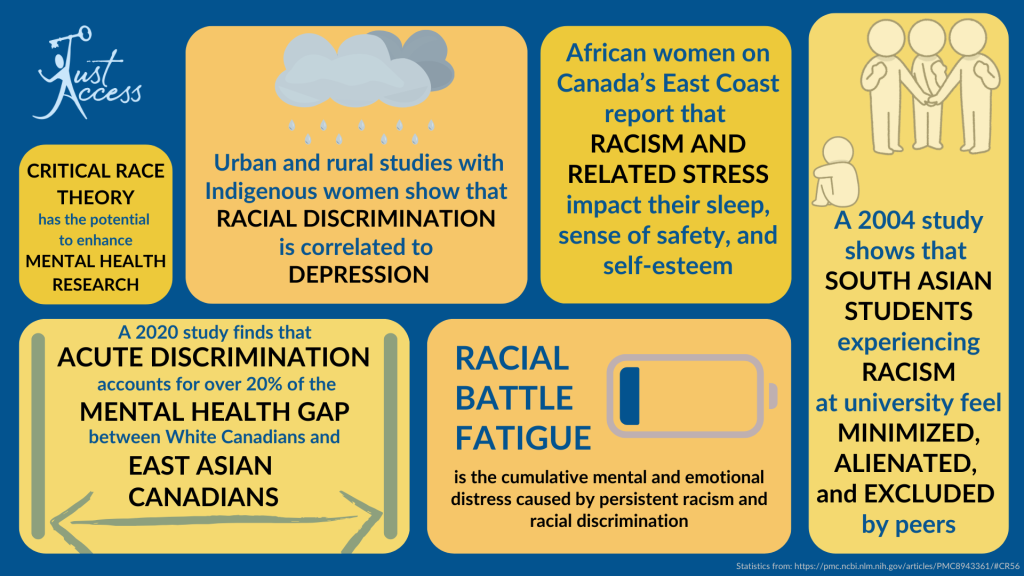
Bertina Lou
Just Access Legal Fellow
mental health, race, critical race theory, Canada, population health, health, healthcare, access to healthcare, mental healthcare, access to mental healthcare, sociology, population health, health research, population health research, public health, research methodology
This post is the second part of a two-part blog series.┬Ā To read part 1 of this blog post, click here.
The 21st to 27th of March marked the United NationsŌĆÖ Week of Solidarity with the Peoples Struggling against Racism and Racial Discrimination, representing an opportunity to reflect on the difficulties of such experiences as well as their impacts on mental health.
The adoption of a new perspective on mental health disparities that includes critical race theory could represent a solution and an opportunity to advance studies on Canadian population health. Specifically, it offers an explanation of the underutilization of mental health services by racialized persons beyond culture-based interpretations.
Towards a Critical Race Theory Approach in Mental Health Research
Canadian data certainly allude to the need to analyse race separately from ethnicity and culture.┬Ā A study on mental health service utilization by ethnicity in Canada shows that even among immigrants, white immigrants are more likely to use mental health services than all other groups of racialized immigrants and, in fact, have similar rates of mental health service use as white, Canadian-born individuals.┬Ā Ethnic disparities in mental health service utilization therefore cannot be entirely attributed to immigrant status, linguistic barriers, or level of acculturation to Canadian society.

Canadian data certainly allude to the need to analyse race separately from ethnicity and culture.┬Ā A study on mental health service utilization by ethnicity in Canada shows that even among immigrants, white immigrants are more likely to use mental health services than all other groups of racialized immigrants and, in fact, have similar rates of mental health service use as white, Canadian-born individuals.┬Ā Ethnic disparities in mental health service utilization therefore cannot be entirely attributed to immigrant status, linguistic barriers, or level of acculturation to Canadian society.
Support our work!
We can only do our work thanks to the support of brave, passionate people like you!
Your donation will help us to keep fighting for human rights and access to justice for everyone, everywhere.
The Effect of Racial Discrimination on Access to Healthcare for Mental Health
The application of critical race theory to mental health research presents an opportunity to advance the existing health literature in Canada, which is lacking with respect to the effects of racial discrimination on mental healthcare access.┬Ā Understanding the relationship between racism and mental healthcare access can help to enhance Canadian population health, particularly as it relates to enabling preventative mental health measures and creating safety around accessing mental health services.
Research from other countries has already demonstrated that racism constitutes a public health issue not only because of its detrimental impact on mental health but also because it impacts help-seeking. It has been found to hinder healthcare access in two ways: by being a barrier to receiving mental health services and by impeding individual help-seeking behaviors. Racism is therefore a known factor in the production of unmet mental health needs and warrants further investigation in the Canadian context.
Racism should be at the centre of discussions on mental healthcare access, explicitly examining racial discrimination as an explanation for the underutilization of mental health services by racial minorities

Conclusion
Given CanadaŌĆÖs recognition of mental health as a universal human right and commitment to mental healthcare access for all Canadians, empirical research that appropriately integrates critical race theory within analyses of mental health disparities has the potential to be consequential in driving policy development and decision-making.
The application of critical race theory to mental health research represents a valuable theoretical perspective that not only contextualises findings in a meaningful way but, above all, seeks to promote social justice and to improve the life quality of racialized persons.
The research leading to these blog posts has been published as a scholarly article on SSRN. To download and read the article (no paywall) click here.
Just Access e.V. is a non-party political organisation, whose mission is to support human rights and access to justice worldwide. ┬ĀThe views and opinions expressed in this piece and those of the author, and do not necessarily represent those of Just Access e.V.┬Ā
Subscribe to the Just Access newsletter
Don’t miss any of our blog posts, or any of our other great content!
Stay up to date with our work by subscribing to the Just Access Newsletter (six mailings per year).









